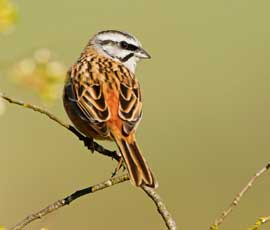CAP budget a ‘terrible deal’ for wildlife

Budget cuts to the Common Agricultural Policy (CAP) are a “terrible deal” for wildlife-friendly farming in the UK, say conservationists.
EU funding for conserving the agricultural landscapes has been cut by about 10% during the next seven years, it was announced last week.
From 2014, this could mean significant cuts to the £400-500m spent annually in England on maintaining hedgerows, wildflower meadows, wetlands and other important natural habitats.
The RSPB described the deal as “regressive” and warned of “potentially huge cuts for payments for wildlife-friendly farming”.
Martin Harper, the RSPB’s conservation director, said: “Wildlife across Europe will pay a heavy price for this terribly regressive deal, and we’re bound to see further declines in some species whose numbers have crashed. Since the 1980s Europe has lost 300 million farmland birds. How many more will we lose over the next seven years?”
The RSPB called on DEFRA secretary Owen Paterson and his counterparts in the devolved administrations to take the necessary decisions to make good on their environmental promises.
“This means using the flexibility to shift as much funding as possible from direct payments into rural development, the bit of the CAP that can really drive more sustainable farming,” said Mr Harper.
But the NFU said it was vital that UK farmers were treated fairly – both in budgetary terms and in terms of the “greening” conditions that are imposed on them.
NFU president Peter Kendall said he was pleased that heads of government have agreed that the “greening” of the CAP will not require land to be taken out of production and that the capping of payments to larger-scale farmers will be voluntary at member state level.
But he added that a “regrettable part” of the budgetary deal was the confirmation that member states or regions could move up to 15% of their Pillar 1 (single payment scheme) budget to Pillar 2 (rural development) without any obligation for national treasuries to matchfund – and all member states could move 15% and some up to 25% in the other direction.
Mr Kendall said: “For the NFU, there is no justification for DEFRA to move money from Pillar 1 to Pillar 2. The ‘greening’ of the first pillar reduces the need for spending in Pillar 2. Furthermore, to reduce our farmers’ payments, which are already well below the EU average, and at a time when others may increase theirs, would be to compound an already unfair situation.”
The EU budget for Pillar 2 of the CAP, which supports nature-friendly farming, will be €84.96bn (£72.39bn) for the period 2014-2020, a reduction of about €11bn (£9.37bn) from the EU budget period 2007-13.
The deal now opens the way for an agreement on CAP reform, which the Irish presidency hopes to conclude in June.
CAP reform: Hopes pinned on ‘luck of the Irish’
